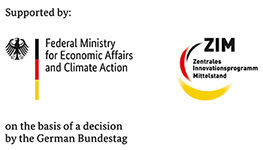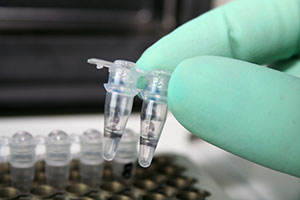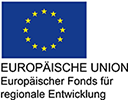News
Breakthrough Discovery: Shared Tumor-Specific TCRs Open the Door to Scalable, Off-the-Shelf Immunotherapies
Berlin, May 2025 – A newly published study on bioRxiv (DOI: 10.1101/2025.04.26.650660v1) demonstrates what could be a turning point in cancer immunotherapy: using a novel TCR clustering approach, we identified tumor-specific T-cell receptors (TCRs) that are shared across patients and cancer types – a finding with broad potential for off-the-shelf TCR-T therapies and T-cell engagers.
Beyond the science lies a scalable opportunity: These TCRs show pan-cancer reactivity (lung, pancreas, breast, colorectal), enabling off-the-shelf TCR-T therapies – without requiring prior knowledge of the target antigen.
At HS Diagnomics, we specialize in antigen-agnostic TCR discovery. Our TCancerR database holds a growing catalogue of shared, tumor-specific TCRs – a high-value asset for companies aiming to build scalable pipelines in oncology.
This study, in collaboration with TheryCell GmbH, Vivantes Hospital, and Charité University Hospital Berlin, proves that deep immune profiling can deliver truly translatable targets.
We are actively seeking partners and investors to accelerate the development of these assets. Let's turn this scientific advance into real-world therapies – together.
Advancing Cancer Immunotherapy with Novel KRAS-Q61H TCR-T Therapy
Berlin, April 2025 - HS Diagnomics GmbH, a leader in tumor-specific T-cell receptor (TCR) discovery, is making significant strides in the development of personalized immunotherapies for cancer. In a recent publication in Frontiers in Immunology, HSD demonstrates the successful validation of its approach and introduces a TCR-T therapy concept targeting KRAS-Q61H - a recurrent mutation driving the proliferation and progression of several aggressive cancers, including lung, pancreatic, and colorectal cancers.
This innovative strategy leverages HSD’s proprietary TCRsafe® technology to identify tumor-specific T-cell clonotypes targeting an immunogenic neoantigen peptide and establishes a strong foundation for the development of a novel TCR-T therapy for patients with KRAS-Q61H-mutated cancers.
The work was performed in collaboration with clinical partners such as Vivantes – Netzwerk für Gesundheit GmbH, Medical Center Mainz University, and Boehringer Ingelheim International. In addition, with Charité University Hospital Berlin in the ongoing TCR-T ProFit project, HSD is currently advancing this novel adoptive cellular therapy toward clinical application. Moreover, by utilizing its TCancerR database, comprising high-resolution TCR profiles of over 100 patients, the company is advancing personalized TCR-T therapies with high precision. This promising development offers new hope to patients with solid tumors, underscoring HSD’s role as a pioneer in TCR profiling and cancer immunotherapy.
For more details on this milestone achievement, read the full publication in Frontiers in Immunology here.
Project Update: HS Diagnomics has entered into the international collaborative project ELEVATE with TU Wien, NMI Tübingen, Sciospec, UpNano, and THT Biomaterials
Berlin, June 2024 - HS Diagnomics GmbH presents an update on the ELEVATE project, a bioelectronic platform for personalized cancer therapy based on 3D-printed spheroids and patient-derived microtumors.
Project Highlights
- ETIR System Development: The Electronic Tumor Impedance Readout (ETIR) system is a sensitive microchip device for the testing of cancer cell responses to various treatments. The micro-scale format is especially suited for patient settings where tumor material is limited.
- Cancer with high medical need: ELEVATE is focused on pancreatic cancer, a disease notoriously resilient to standard treatments and associated with high mortality.
- Cutting-edge tissue formats: Primary tumor cells are established in 2D and 3D cultures including 3D-printed spheroids and patient-derived microtumors. PDMs are more representative of natural tumor tissues because they retain a native tumor microenvironment.
- Innovative adoptive cellular therapy: HS Diagnomics applies its proprietary approach to the personalized identification of tumor-specific T-cell receptors (TCRSafe™) to each patient model and selects the immunodominant TCRs for the manufacturing of therapeutic TCR-T cells. The cellular product is then tested against the autologous tumors using the ETIR platform.

HSDiagnomics partners with Charité University Medicine Berlin, TheryCell GmbH, and EPO GmbH in an innovative project to advance TCR-T therapy for solid tumors
Berlin, October 30, 2023 - HSDiagnomics, in collaboration with TheryCell GmbH, EPO GmbH and Charité University Medicine Berlin is excited to launch a cutting-edge project aimed at advancing the identification and preclinical validation of tumor-specific T-cell receptors (TCRs) for TCR-T cell therapy of solid cancers.
Building upon HSDiagnomics' proprietary antigen-agnostic approach successfully validated in Non-Small Cell Lung Cancer (NSCLC), this novel methodology to identify tumor-specific T-cell receptors will now be extended to more solid cancers with high medical need.
The collaborative effort of three Biotech companies and the Dept. of Hematology, Oncology & Cancer Immunology and the Institute of Pathology of the Charité will focus on identifying and validating tumor-specific T-cell receptors for Pancreatic Ductal Adenocarcinoma (PDAC), Colorectal Carcinoma (CRC), and Breast Cancer (BC). This ambitious project aims to advance TCR-T therapies ranging from the selection of therapeutic TCRs to establishing a GMP-compliant workflow for the manufacture of therapeutic doses of personalized as well as off-the-shelf TCR-T cell therapies.
The project is funded for three years by the ProFIT program of the IBB Berlin and the European Union (EFRE, Europäischer Fonds für regionale Entwicklung), underscoring the significance and potential impact of this pioneering initiative.
TCRsafe® analysis of a Runx1 knockout mouse model provides evidence for a role of RUNX1 as a recombinase cofactor for TCRß rearrangements and pathological deletions
Seitz et al. Sci Rep. 2020;10(1):10024. <Free article>
In this work, a Runx1 knockout mouse model was analyzed with quantitative TCRsafe® technology, which was optimized employing a reference template. This ensured precise measurement of changes in the murine T-cell receptor (TCR) repertoire as a consequence of Runx1 functionality. It could be demonstrated that Runx1 binds to the initiation site of TCRß rearrangement and its homozygous inactivation induces severe structural changes of the rearranged TCRß gene, whereas heterozygous inactivation had almost no impact. Furthermore, published sequence data was reanalyzed from recurrent deletion borders of ALL patients carrying an ETV6-RUNX1 translocation, demonstrating that RUNX1 motifs were significantly overrepresented at these deletion ends. Additionally, it was shown that a RUNX1 motif overlapping with a cryptic recombination signal sequence at a recurrent breakpoint in the CDKN2A/B locus was functionally relevant. As TCRß rearrangement can be seen as a physiological deletion process, our data collectively imply a role of RUNX1 as recombinase cofactor for both physiological and aberrant deletions.
ZIM-Project TCR-specific Antigen Identification - TAgID
TAgID is an HSD project funded by the Central Innovation Programme for small and medium-sized enterprises (SMEs; Zentrales Innovationsprogramm Mittelstand, ZIM) in partnership with the Technical University of Berlin. The collaborative activities aim at developing an innovative approach for the identification of peptide/MHC-complexes recognized by tumor-specific T cell receptors (TCRs) (https://www.zim.de/ZIM/Navigation/DE/Meta/Englisch/englisch.html, Grant number: 16KN073238.)
Patent granted for the identification of tumor-specific T-cell receptors
The granted patent (EP3180433B1) “Method for providing tumor-specific T cells” encompasses the quantitative TCRsafe® high throughput T-cell receptor (TCR) repertoire analysis of tumor infiltrating T-cells compared to T-cells infiltrating adjacent corresponding normal tissue (and/or present in peripheral blood) and an in-house developed software package, which enables the identification of the tumor-specific TCR repertoire for each individual patient. Complete decoding of paired α and ß chains of tumor-specific TCRs facilitates synthesis and cloning of TCRs that can be applied to genetic engineering of patients’ autologous T cells. These engineered T cells are used as tumor-specific probes for the discovery of tumor antigens. They can also be used for adoptive T cell therapy (see https://www.therycell.de).
HS Diagnomics GmbH
Schloßstrasse 110
12163 Berlin
Germany
Tel. +49(30)700 14 53 30
Fax +49(30)546 11 698
Customer Support
Tel. +49(30)700 14 53 31

News
05/2025
Breakthrough Discovery: Shared Tumor-Specific TCRs Open the Door to Scalable, Off-the-Shelf Immunotherapies. A newly published study on bioRxiv (DOI: 10.1101/2025.04.26.650660v1) demonstrates what could be a turning point in cancer immunotherapy.
Read more ...
04/2025
Advancing Cancer Immunotherapy with Novel KRAS-Q61H TCR-T Therapy. HS Diagnomics GmbH, a leader in tumor-specific T-cell receptor (TCR) discovery, is making significant strides in the development of personalized immunotherapies for cancer.
Read more ...
06/2024
Project Update: HS Diagnomics has entered into the international collaborative project ELEVATE with TU Wien, NMI Tübingen, Sciospec, UpNano, and THT Biomaterials
Read more ...
10/2023
HSDiagnomics partners with Charité University Medicine Berlin, TheryCell GmbH, and EPO GmbH in an innovative project to advance TCR-T therapy for solid tumors
Read more ...
06/2020
TCRsafe® analysis of a Runx1 knockout mouse model provides evidence for a role of RUNX1 as a recombinase cofactor for TCRß rearrangements and pathological deletions
Read more ...
08/2019
ZIM-Project TCR-specific Antigen Identification - TAgID
Read more ...
04/2018
Patent granted for the identification of tumor-specific T-cell receptors
Read more ...


